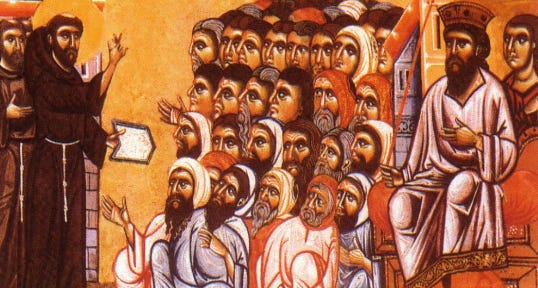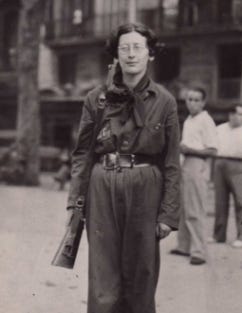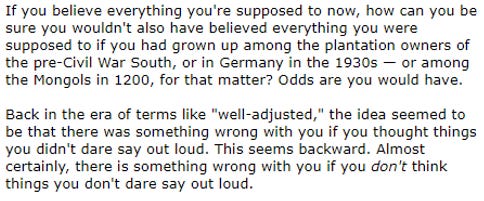“Truth forever on the scaffold, Wrong forever on the throne,— Yet that scaffold sways the future, and, behind the dim unknown, Standeth God within the shadow, keeping watch above his own.”
— James Russell Lowell, The Present Crisis
This article is not about holy fools in the specific, historical sense. Rather, I am referring to a political archetype: the holy fool as he relates to our collective values and decisionmaking processes.
The holy fool is one who does not back down from a moral confrontation with society. He is not concerned with worldly status seeking, political effectiveness, or even common sense. She is not trying to build a career, a movement, or a coalition. Holy fools shape the course of history, but rarely wield power directly. Holy fools are willing to pay high external costs for internal coherence.[1]
Many saints and culture heroes are holy fools. They can steer the course of whole civilizations. But their actions defy all “rules” of “effective” political activism. They tend to be cantankerous and contrarian. They are often pacifists, and when they do engage in violence, it is likely to be spectacularly ineffective.
In a political movement the holy fool smashes the Overton window precisely because she does not give a damn about the Overton window. Less principled “realists” who agonize over appearing too radical dwell in the sensible world of mediocristan. They want the comfort and security of majority backing, when in fact history is shaped by intransigent minorities.
For this reason, the holy fool can be more powerful than the "realist” who believes that a tempered, unprincipled and median approach is best.
Holy fools are over-represented among lifelong activists, but not all lifelong activists are holy fools. A good indicator of a holy fool is a willingness to break from the party line. Their principles often lead them into conflict with the movements which valorize them. For example, anarchists Emma Goldman and Alexander Berkman became pariahs when they returned from the USSR and reported honestly on its moral failures.[2] Radical anti- Vietnam war Jesuit Daniel Berrigan’s pro-life activism sits uncomfortably within the post-1960s left counterculture. Broad ideological movements are coalitions: they bend their principles to satisfy the factions that make up the coalition.
The holy fool is a warrior armed with meaning. The holy fool sees the cracked moral and philosophical foundation of our collective social myths. Consensus is often built on an unstable preference equilibrium, which the holy fool can deflate.
Movements cannot consist entirely of holy fools. But a true realist must recognize the strengths of the holy fool. And if they are not hardhearted, they should also see something innocent and even childlike in the holy fool.
Reinhold Niebuhr understood the virtues and failings of the holy fool. A Christian, he abandoned pacifism during World War II to express support for the war effort against the Axis. He was also aware of the need for nuclear deterrence during the Cold War. Nuclear deterrence works by holding hundreds of millions of civilians hostage. Not surprisingly, it is a moral anathema to holy fools. Yet once knowledge of nuclear weapons had been brought into the world, nothing stopped dark powers from employing them other than the threat of their retaliatory use.
Facing down the great tyrants of the 20th century required a grim sobriety not possessed by holy fools.
This is Moloch: adapt to the logic of this world or be overrun by those who do.
No Surrender to Moloch
“My work is done. Congratulations, Katara. You’re a bloodbender.”
— Hama
Moloch contains the sum of all survivorship filters that favor jettisoning any moral consideration. It is every pressing instrumental rationality that produces monsters.
The holy fool refuses a surrender to any logic which prizes victory and survival over any overriding moral principles. The holy fool prefers death to compromise.
A holy fool might walk unarmed and unflinchingly towards a confrontation with power, like Saint Francis approaching the Sultan.[3]
Examples of Holy Fools
The holy fool might include the guy who camps out for months on the lawn of parliament whenever there’s a war, the radical Christian serving time for taking a sledgehammer to a fighter jet, or that crust punk or hippie who refuses to become complicit in all the dirty processes that lurk behind global supply chains.
They are cranks. When they have the mandate of heaven, they are incredibly powerful. Not every holy fool has the mandate of heaven, but if you care about having the mandate of heaven you can never be a holy fool.
Simone Weil went to fight in the Spanish Civil War in and came into conflict with her fellow fighters –arguing with Durruti over his decision to execute a teenage prisoner of war. She was a terrible soldier who was kicked off of her unit for her apparent death wish. Apocryphally, she starved herself to death for refusing to eat more than those deprived by war rationing – a completely futile form of solidarity. There is a vast quantity of secondary literature and biography about her life and philosophy. She is considered by many to be a saint, a great mystic and moral visionary of the 20th century.
Benjamin Lay was a Quaker, abolitionist and vegetarian. He lived in a cave, grew his own food, and made his own clothes. He was a passionate and early opponent of both slavery and animal slaughter. He once kidnapped the child of a slave owner in order to demonstrate to the slave owner how slaves must feel.
False Fools: The Thrill of Refusal and the Security of Submission
A common and naive conceit that many people have is that all their stances are principled and internally coherent. The most obvious expression of this is among those who believe they would have chosen the side of the persecuted minority in any great moment of collective moral reckoning – but have no costly, unorthodox beliefs in the present moment.
Because of the archetypal and cultural power of the holy fool, there are those who want the status and influence of the holy fool but do not want to bear the costs. They desire the thrill of refusal and the security of submission. They may adopt the outward form and habits of the holy fool but lack the commitment to self consistency over worldly concerns.
False fools rarely (if ever) deviate from the party line: their political stances can be easily predicted by whatever coalition they are part of. They may also be career activists (the kind with paycheques, speaking gigs, or book contracts).
Their dissent often takes the form of the “fifty Stalins” variety:
False fools might also have good reasons for doing what they do. They may be engaging in tactical compromises to work towards what they see as a goal of overriding moral importance. But this is not a characteristic of a true holy fool, who is constitutionally incapable of such compromises.
Epilogue
My hope in writing this is that you will not excorciate yourself for failing to be a holy fool (as I once did) nor dismiss them as hopeless cranks. I also hope that you will not join any jeering mob that persecutes a holy fool. Like all archetypes, the holy fool is not a universal ideal but a niche in an ecology of meaning. And like all archetypes, there are appropriate times to invoke it in our lives: to stand on our principles, consequences be damned.
[1] “Here’s a curious paradox: the more you insist on sticking to a straight-and-narrow path defined by your own evolving principles, rather than the expedient one defined by current situation, the more you’ll have to twist and turn in the real world. The straight path in your head turns into spaghetti in the real world.
On the other hand, the more your path through the real world seems like a straight road, defined by something like a ‘standard’ career script, the more you’ll have to twist and turn philosophically to justify your life to yourself. Every step that a true Golden Boy careerist takes, is marred by deep philosophical compromises. You sell your soul one career move at a time.” – Be Slightly Evil: A Playbook for Sociopaths by Venkatesh Rao
[2] The anarchists have a disproportionately high number of holy fools. As the beautiful losers of the 20th century, they attract those disaffected by the moral failures of authoritarian leftism. Of course, not all anarchists are holy fools: many are partisan ideologues.
[3] If you’re not a holy fool, don’t do this. If you are a holy fool, nothing I could write would talk you out of it anyways.






Loved this! I feel like Mr Rogers is one of the most well kempt manifestations of these principles. Calmly and gently pulled off his crusade while internal-coherence maxxing.
Used to be a holy fool aspirant, nice to read this